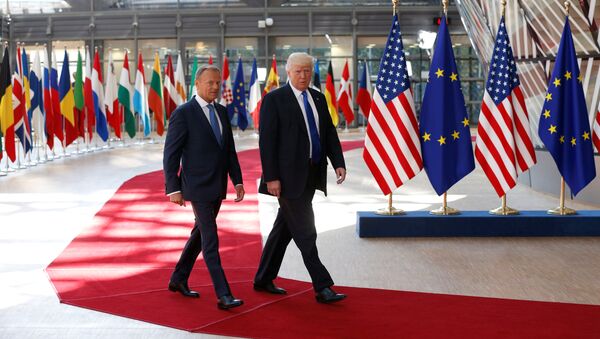German Foreign Minister Heiko Maas has pointed out in an interview with the news agency DPA that Europe and the US used to conduct multiple consultations over important issues before jointly making decisions, after they had been approved at all levels. However, the current state of affairs is different, he says.
“Now we learn some of the US decisions from Twitter. One sometimes has an impression that US citizens also learn about decisions made by the White House from Twitter. This changes the way we work together,” the minister noted.
He went on to say Europe should behave in a more confident way in relation to the US and adjust to new realities.
“Many think that they can 'outsit' Trump, but this belief is a mistake. In transatlantic relations, there are structural changes, which will be still in place even after Trump, so Germany and Europe have to adjust to them strategically,” Maas remarked on Twitter.
Viele denken, sie könnten Trump aussitzen, nach ihm werde alles wieder wie davor. Das halte ich für eine Fehleinschätzung. Es gibt strukturelle Veränderungen in den transatlantischen Beziehungen. Darauf müssen wir uns in Deutschland und vor allem in Europa strategisch einstellen.
— Heiko Maas (@HeikoMaas) 23 сентября 2018 г.
Relations between Washington and the European Union have significantly soured since Trump announced the US’ pullout from the landmark Iranian nuclear deal as well as the introduction of tax duties on steel and aluminum, thereby provoking a tense trade spat between Europe and the US.
In response to Trump’s renunciation of the JCPOA (Joint Comprehensive Plan of Action) the EU issued a statute to block the sanctions re-imposed by the US with regard to Iran and retaining business ties with the country. The blocking measure sought to insulate European firms and keep alive a deal reached in 2015 to curb the Iranian authorities’ nuclear aspirations.
READ MORE: China Concerned US Could Pull Out of WTO Deal Cutting Tariffs on Tech Goods
Separately, in retaliation for Trump’s steel and aluminum tariff hikes, Brussels slapped additional 25-percent duties on a range of US imports.
No less of a stumbling block in Germany-US relations is liquefied natural gas (LNG), which US companies reportedly expect to start delivering to Germany no later than in 2022, while the less costly Russian gas from the Nord Stream 2 pipeline is due to be available to Germans by the end of 2019.



